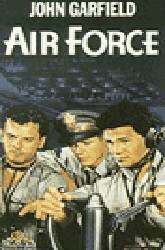
AIR FORCE
US, 1943, 124 minutes, Black and white.
John Garfield, Gig Young, Arthur Kennedy, Charles Drake, John Ridgley, Harry Carey, George Tobias, Stanley Ridges, Moroni Olsen, Edward Brophy.
Directed by Howard Hawks.
Air Force is a well-made war propaganda film of 1943. It was written by veteran Dudley Nichols and directed by Howard Hawks, a director with interest in planes and flight (Only Angels Have Wings).
The film begins on 6 December 1941, focusing on a group in a plane on a test flight. They suddenly become involved, over the Pacific, in the news about Pearl Harbor, have to land for an emergency on one of the Hawaiian islands, proceed to Pearl, to Wake Island and have to make their way to the Philippines.
The film and its plot are seen in the perspective of the uncertainties of World War Two. It is interesting to look at this story and its perspective in the retrospect of the outcome of the war.
Filmed in black and white, with a veteran cast from Warner Bros led by John Garfield, the film focuses on a small group and thus dramatises the impact of the war on American servicemen and on the American people. It ends with a note of urgency.
1. War film? Story of war action? Morale-boosting? Propaganda?
2. Black and white photography, aerial sequences, flying, battles? War sequences? Musical score?
3. The title, the focus, American preparedness for World War Two, neutral, involved, Pearl Harbor?
4. The presentation of the plane and its name: Mary Ann? The crew and their personalities, their roles? The strong cast portraying the crew? Audiences learning about them individually: the pilot and his wife hurrying to the airport, his support of the men, his clash with the failed pilot-become-bomber? The bomber and his resentment, wanting to leave the army, his gradual involvement? The navigator with the hero pilot for father? The old veteran and his wise words, his son and his son's death? The other bomber, his concern about his sister? The other members of the crew, the radio operator and his mother's concern? Typical men? Typical crew?
5. The mission, the ordinariness of the flight, the expected return? The enjoyment of the flight? The Japanese voices, the bombings? The uncertainties? The emergency landing, the Japanese snipers? Continuing on the journey, the sight of Pearl Harbor? Discussions? Going on, reconditioning the plane? The landing at Wake Island? The threat of the Japanese, stealing the parts, rebuilding the plane? Flying on to the Philippines? The sighting of the Japanese navy? Being hit, the bombardier bringing the plane down? The death of the pilot? The involvement in war?
6. Audience knowledge of the war at the time? Pearl Harbor, Wake Island, Manila and the Philippines? The perspective of '43? Subsequently?
7. A well-made war film? Morale-booster?